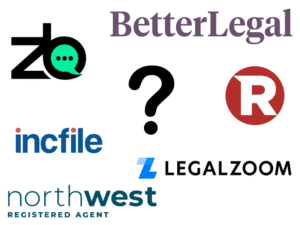Introduction
There are several ways businesses are structured in the United States (U.S.). If you are thinking of starting a business in the U.S., it is essential to understand what each of these structures entails and the advantages and disadvantages. We briefly explain the five types of business and hone in on the limited liability company. By the end of this article you will know how to start an LLC.
A business structure is a legal statement representing how the company is organized and structured. It defines who owns the company, where it is located, and the strategy. Before registering the business with local, state, or federal governments, the business owners design its structure. Carefully research what type of business fits best with your business model. If you are uncertain, consult with an expert in structuring a business before making your decision.
Editorial Note: We earn a commission from partner links on Startup Honcho. Commissions do not affect our editors’ opinions or evaluations.
Recommended Partners
$49 + State Fees
Varies By State & Package
$0 + State Fees
Varies By State & Package
$0 + State Fees
Varies By State & Package
Business Structure
Before you register your company, you must decide on a few factors. How you structure your business changes your risk of personal liability, the way you pay taxes, and whether you can raise capital. You can structure your business in five ways:
- A sole proprietorship has one owner and no employees. It is simple to set up, and as the owner, you are liable for all business debts and losses.
- A limited liability partnership (LLP) has two or more people with equal ownership and is equally liable for the business’s debts.
- A limited partnership (LP) has two or more people with unequal ownership. Some partners or investors have limited decisions in running the business, and they are not liable for business debts. Profits are reflected in personal tax returns.
- A corporation is a more regulated business structure where record-keeping and tax requirements are required.
- Limited liability companies are hybrid business structures taking the best from partnerships and corporations. They work well for single-member LLCs, medium-sized or high-risk businesses, because they protect your assets, and you pay a lower tax rate than with a corporation.

What Is Limited Liability?
Limited liability in business is a legal entity where the owners (shareholders) have invested in the business to protect or limit against financial losses. The business structure is such that the owners have personal liability protection for the amount of capital they invested in the business.
Historically, many small business owners and industries became big businesses and large enterprises in the U.S. because of the low investor risk. Investors were happy to put their wealth into an exciting new limited liability company because it had limited personal responsibility, and it was a safer investment.
Limited liability ensures that in a corporate loss, the investors are only liable for the amount they invested in the partnership. The partnership is known as a limited liability company (LLC).
What Is A Limited Liability Company (LLC)?
One of the ways of structuring a business in the United States is to form a limited liability company (LLC). It fills a business arrangement between the corporate world and smaller partnership-type businesses. The advantage of being an investor or member of an LLC is that you are financially exempt if the company owes money or has liabilities. It is simple to structure an LLC business and protect your assets.
Any corporation, foreigner, foreign business enterprise, other limited liability companies, or individuals can own or form an LLC— the only exceptions are banks and insurance companies.
An LLC has pass-through taxation meaning that the profits and taxes pass through the company to the LLC owners who report these figures on their tax returns.
Articles of organization must be filed with the U.S. state where the company is registered. There are minor differences in the requirements for registering an LLC in each U.S. state.
How To Start An LLC
Starting an LLC can be a daunting prospect, especially if you are not partial to legalities and forms. Many business owners want liability protection and register their company as an LLC. Setting up an LLC is straightforward if you follow the various steps below. You may also be interested in using incorporation services to simplify the process.
Step One: Register Your LLC
If you are a new business owner, you must know which U.S. state your business will operate from. More than likely, it is where you live. But, perhaps you plan to open several small businesses. If your LLC has a physical presence, such as an office or people employed in these different U.S. states, you will have to go through the process of foreign qualification to register an LLC in those states.
File For A Foreign Qualification
You may be uncertain whether your proposed limited liability company is, by definition, operating a business in one state or multiple states. The waters have been muddied slightly in today’s virtual world, where people offer their expertise across state borders. We need to help you clarify what conducting business means in terms of a limited liability company.
The Meaning Of Conducting Business
By definition, you are conducting business when:
- a significant portion of your company’s revenue comes from the state
- you pay state payroll taxes
- you have a business license in the state
- you work out of a brick-and-mortar building
- you frequently have face-to-face meetings with clients
Conducting Business In More Than One State
It is difficult to establish whether you are conducting your business in one or several states and whether you must file for one or many LLC licenses to run your company.
Here are some pointers:
- If you own a string of shops in different U.S. states, you are running a business in all of those states, and you will need to file a foreign qualification in each of those states.
- If, however, you live in one state and have a physical business in another state, you don’t need a foreign qualification unless you start operating in your home state too.
- If one of your business partners obtains business income in another state where you have registered your LLC, you’ll need to file a foreign qualification.
- Perhaps you work from home as a consultant and have a business license registered in your home state. Your numerous clients do not all live in your U.S. state. You do not need to file a foreign qualification.
- Your legal obligation is to file a foreign qualification if you do business in numerous states. The penalty for not registering in the correct states could be a heavy fine, added back taxes, or interest to pay for any time that you failed to do this.
- Every foreign qualification comes with administration, extra annual fees, and different state laws. So think about it carefully.
If you are unsure about filing a foreign qualification, clarify it with your accountant or lawyer.
Step Two: Choose A Business Name
Your choice of business name must be unique, meaning that no other business in that state has that name. You can search for a business name online to check this.
The business name that you choose must meet the legal requirements of that state rather than suiting your marketing strategy. Specific words are not allowed. Words like insurance, lawyer, or school complicate the process as they require more administration. You cannot incorporate words like FBI and Treasury into your business name.
Step Three: Choose a Registered Agent
To register an LLC, you require a registered agent. A registered agent receives all the official and legal correspondence for the LLC and then hands them to the person in charge of the LLC.
Anyone can be a registered agent as long as they are older than 18 and have a physical address within your state or a corporation authorized to conduct business in that state. If this part of the process is stressful for you, we recommend hiring registered agent services.
Step Four: File The Articles of Organization
To make the LLC legal, you must log the articles of organization with the agency in your U.S. state that handles this administration. This document lists the distribution of powers, duties, liabilities, and rights for each member of the LLC.
You can complete the LLC’s formation documents online or by mail, or you can hire an LLC formation service to file for you — filing fees are about $100. Before you do this, you must decide who will manage the business. You may want the LLC management and members to make decisions jointly, or you might decide to allocate one person to manage the day-to-day affairs.
The information required for the articles of organization include:
- The business name
- The physical address
- The core business
- The management style of your LLC
- Contact information for the registered agent
- The duration of the LLC
When you have gathered and completed the form, the LLC members sign the form. Some states ask that you have a newspaper notice before filing for the articles of organization. The filing fee for articles of organization differs from state to state.
When the LLC approves these documents, the state issues a certificate and formally registers the LLC. The next step is to set up a business bank account and get a tax identification number.
Step Five: Create An Operating Agreement
Operating agreements are legal documents containing the details of how you and the members plan to run the financial and legal side of the business and how you plan to manage it. An LLC operating agreement should show the business motives and plans, e.g., profit distribution, work distribution, and what happens to members if they leave the LLC, are examples of planning.
The states in the U.S. have different requirements for an operating agreement, but members need to plan for every eventuality before they start to work together.
A straightforward single-member LLC can create an operating system using an online template, but we suggest hiring an attorney with multiple members.
The main sections of an operating agreement include:
- Specific details on each member, their position, salary, and voting obligations
- Details on who is going to organize the company
- Details of each contribution of capital and who contributed
- Place details about possible future actions, e.g., resignations, disputes
- Details on action to be taken if the company dissolves
- A severity clause to protect the agreement
Step Six: Get an Employer Identification Number
The rules state that you need an employee identification number (EIN) if your business is a partnership or corporation. If you file excise taxes, you need an employee identification number (EIN) for your business for the Internal Revenue Service (IRS). An EIN is required to open a bank account, get recognition for business credit, and lower identity theft risk.
If you run a nonprofit business or a trust, you must have an EIN for tax reporting purposes.
The online IRS EIN Assistant website will take you through the various steps — it is free.
Conclusion
An LLC offers limited liability protection. The owners (shareholders) invest in the business to protect or limit their personal assets. The business structure is such that the owners have personal liability protection for the amount of capital they invested in the business. If a business is in financial trouble, an LLC protects the owner’s cars, homes, and other valuables because their personal and business accounts are separate.
Set Up Your Business in 10 Minutes or LessThe content on StartupHoncho is solely for the purpose of educating users on featured products, and is not meant to offer financial advice. It is advised that readers of the website conduct their own research before purchasing featured services, as the deals and terms of the featured services may change anytime at the vendors’ sole discretion. StartupHoncho does not guarantee the accuracy and completeness of the information presented, nor take responsibility for the quality and delivery of the services featured on the website.
StartupHoncho creates its content based on independent research and feedback collected from users of featured services and products, and adheres to strict editorial policies. The rankings, ratings, comments and expressions about featured services are not endorsed by third parties or vendors, and solely reflect the views of our independent editorial team.















